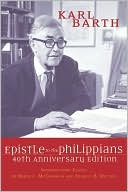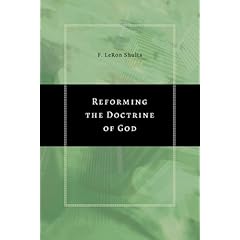 I think it is fair to say that hermeneutics, and specifically hermeneutics as it relates to cultural anaylsis, is one of the most pressing issues facing the church today. How we understand Scripture to relate to its original culture and how we appropriate it in our own culture is one of the issues that is driving our current era of church history. How we understand issues such as those surrounding women and homosexuals are very live and important questions in our day. And this is why I commend William Webb's book as highly as I possibly can. He addresses these issues by carefully probing the underlying hermeneutical questions with thoroughness and and an irenic and humble spirit.
I think it is fair to say that hermeneutics, and specifically hermeneutics as it relates to cultural anaylsis, is one of the most pressing issues facing the church today. How we understand Scripture to relate to its original culture and how we appropriate it in our own culture is one of the issues that is driving our current era of church history. How we understand issues such as those surrounding women and homosexuals are very live and important questions in our day. And this is why I commend William Webb's book as highly as I possibly can. He addresses these issues by carefully probing the underlying hermeneutical questions with thoroughness and and an irenic and humble spirit.
Webb begins by laying out the Christian's challenge with regard to these issues, "It is necessar for Christians to challenge their culture where it departs from kingdom values; it is equally necessary for them to identify with their culture on all other matters" (22, italics in original). This is difficult because though Scripture contains both culture-bound and transcultural elements, these would have been nearly indistinguishable to its original readers. The challenge, then, is to live out the spirit of the text without being too inseparably bound to the "isolated words." For Webb, this means undertaking a "redemptive-movement hermeneutic" as opposed to a "static" hermeneutic.
A redemptive-movement hermeneutic seeks to assess the "movement" of a text relative to its original cultural setting. It then moves into our own day and seeks to retain the same direction of movement relative to our current culture in places where our cultural setting has gone beyond that of the original culture. An explicit component of this assessment is that the Bible doesn't only contain an "ultimate" ethic, but often contains provisions, laws, and instructions that entail only a "partially realized" ethic. It is worth taking a second to look at the reasons Webb outlines for this to be so, because I don't think this concept is one most readers of Scripture consciously ascribe to. Webb asserts that God often inspired a "partially realized" ethic (1) for pastoral reasons, to stretch his people as far as they could go without snapping; (2) for padagogical reasons, to help people move from the known to a foreseeable future with enough continuity so they can find their way; (3) for evangelistic reasons, thus reform was intended to better social structures without being so radical as to jeopardize other aspects of the Christian mission; (4) to sustain competing values, such as upholding temporary values in pursuit of associated goods, such as slavery in service of social welfare or patriarchy in service to gender differentiation; and (5) for soteriological resons, to to deal with a fallen and sinful humanity to whom reform does not come easiliy and move us in a process of progressive sanctification.
Throughout the book, Webb sustains an argument that, taking the presence of elements of both an ultimate and a provisional ethic within Scripture (and he certainly acknowledges the presence of an ultimate ethic in Scripture), we must undertake careful cultural analysis to determine what components of Scripture are culture-bound and which are transcultural. Once this is done, we seek to uphold the transcultural components and seek to live out the culture-bound components through a process of "redemptive movement" where we seek to follow the redemptive spirit within the text by reapplying that same spirit to our own culture. Let's follow a similar flow to Webb's own argument to flesh this out a bit.
Webb argues that the neutral example of slavery provides an important case study for understanding how a redemptive movement hermeneutic works. The culture of the Ancient Near East and of the Greco-Roman world upheld a structure of slavery. The Bible, written within this culture, reflects this setting, in that it assumes the general structure of slavery. There are no explicit texts or passages that speak directly to the need for the abolition of slavery (except perhaps for Gal 3:28 and parallels); there are, on the flip side, though, many texts that assume that slavery exists. But many of these texts reflect a "redemptive movement," that is, they demonstrate a limited but real movement away from the worst abuses of slavery toward better and more equal treatment of slaves. This movement, when coupled with the ultimate ethic in Scripture that acknowledges the equality of all people before God and the need to love neighbor as self, points toward the need for further movement beyond the movement accomplished in the OT or NT. Thus, as we live out the spirit of these texts, we appreciate our different cultural setting and seek to move closer to the unrealized ultimate ethic of abolition of slavery, and even beyond this toward fuller workplace and economic justice.
Webb takes this same process of analysis into his discussion of texts surrounding women. In that cultural analysis, through the use of eighteen different criteria, he assesses the culture-bound components of patriarchy, relating to economic, social, and practical concerns. This analysis includes a careful exposition of the pertinent New Testament texts in their cultural settings, as well as a thorough discussion of the relation between the testaments on this point, and especially of the role played by Genesis texts in the discussion. He then couples this with an investigation of the ultimate ethic present in scripture, and concludes that the Bible moves toward a complementary egalitarianism or an ultra-soft patriarchy.
The third issue Webb looks at throughout the book is that of homosexuality. This is important in two respects. First, it is important because it is a vital issue in its own right, and second, because it is often related either positively or negatively to discussion of issues regarding women, usually to rhetorical effect. Thus, importantly, Webb demonstrates that the two issues, both needing careful cultural analysis, demonstrate opposite movements within Scripture. Whereas the patriarchy texts evidence a positive movement toward egalitarianism, the homosexual texts consistently demonstrate an absolute movement away from freedom to complete prohibition, and this movement is to be carried over into our own culture, albeit slightly modified.
William Webb's book is often cited and quoted in studies surrounding these important and divisive issues, and this is with good reason. I wish I had read this book years ago, and have deeply appreciated his hermeneutical insights. He shows how to recognize a redemptive movement in Scripture that acknowledges and appreciates the spirit of the text without being too bound to the "isolated words," by which he means the words taken in isolation from their cultural and canonical context. He demonstrates a genuine faithfulness to Scripture and an intense pursuit of God's truth and God's desire for our lives here in the in-between time, while also demonstrating how to carefully move beyond the bare words of Scripture in those cases when it is bound to its cultural setting. I look forward to appropriating his insights in future study. I must say that I also deeply appreciated his humble and irenic tone. He openly acknowledged the areas of greatest weakness in his own case (even writing a "What If I Am Wrong?" chapter to lay bare and discuss these weaknesses and their bearing on his case), and also sought to acknowledge the strengths of his opponents positions and demonstrated charitable readings of opposing views. All the same, I think he also admirably shows the promise of careful cultural analysis for faithful application of Scripture, in a convincing assessment of the issues surrounding both homosexuality and women. I also hope at the very least that this book dismantles the arguments often bandied about that those who favor women in ministry are on the slippery slope to accepting homosexuality or that those who accept women in ministry must make this subsequent move, as Webb demonstrates how this is clearly not so.
In all, this book is a landmark study of hermeneutics especially as it bears on these important issues, and is a must read for those on all sides of these pressing discussions. Do not miss this book, and do not delay.


















